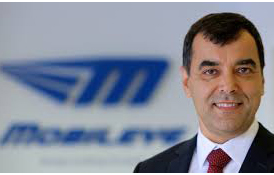
Amnon Shashua, cofounder and chief technology officer of the Israeli company Mobileye, lives and works at the vanguard of self-driving cars.
“Autonomous vehicles are really just a platform for artificial intelligence,” he told a rapt audience at an event hosted by the American Friends of Hebrew University in Centre City. That’s essentially a computer that can perceive risks and make split-second driving decisions.
Say what? That’s right. Shashau’s not like the rest of us — he’s an inventor, a teacher, and a prophet about the future we’re all going to be living.
Shashua still teaches full-time as well at Hebrew University in Israel, despite the fact that the company he helped found, Mobileye, was sold to Intel for $15.3 billion in 2017. Mobileye cameras are embedded in 15 million cars around the world, providing a feature that’s now standard technology on most new cars, known as “assisted” driving.
What the professor means by cars as an AI platform is that the artificial intelligence needed to create a safe, self-driving car is such a leap forward in technology that it will be used in other spin-off inventions.
“Cars are the ideal platform for AI — requiring intelligence, perception, decision-making. Very much like playing chess,” he explained. In addition, “imagine a world where a family only needs one self-driving car. It can drop your kids off at school, then you at work, then go pick up your groceries at the store by itself.”
Investors want to know: Which companies will be the winners and losers in self-driving car space?
Among players in autonomous vehicles are Uber, Alphabet, Apple, Ford, GM, Waymo, BMW, and Volkswagen. Uber is aiming to return to the self-driving road after Alphabet (GOOG, GOOGL) launched the first U.S. commercial robo-taxi service, called Waymo One, in Arizona.
Uber briefly suspended operations after one of its autonomous cars hit and killed a woman crossing a street in March in Tempe, Ariz. It now plans to run vehicles on a mile loop between its offices in Pittsburgh, not exceeding a speed limit of 25 miles per hour.
Apple (AAPL) “has been highly secretive about what they’re doing,” Shashua said. “It’s very hard to pick winners at this point.”
Traffic deaths are the concept killer and carmakers are trying to solve the problem.
“That’s the biggest challenge, how to guarantee safety,” Shashua said. There are 40,000 driving-related fatalities a year in the U.S. But those are committed by humans.
If 40,000 people were killed by self-driving cars, which are just machines, every year, “society wouldn’t accept that,” he added.
“We wouldn’t accept 10,000 deaths a year by computer-driven cars, even though that’s an improvement. We need absolutely foolproof technology,” he said.
When does he see fully driverless cars arriving commercially? In urban centres, such as Philadelphia, not for many years, he said. And it will likely take even longer in rural areas,
where digital maps required for autonomous vehicles are less accurate.
The soonest a self-driving vehicle might launch is 2021, he estimates.
“And that will be a car that can drive only in good weather. We’ll need another two to four years for cars that can drive themselves in bad weather.”
Just a few weeks ago, Shashua and Volkswagen created a joint venture to commercialize VW autonomous vehicles in Tel Aviv, Israel.
“Until 2021, we’ll just be investing. We’re in development stage only. There are no profits yet” in the self-driving car space, nor does he predict profits anytime soon.
What about decades into the future?
“Once all cars are autonomous, say, in 50 years, we don’t need street lights anymore. We may not need parking lots.”
Shashua wouldn’t be drawn into saying which companies would come out ahead first. And he admits there will be social implications.
“What happens to all the cab drivers and truck drivers? The concept of vehicle ownership will change. It’s more economical not to own a car in many cities, so you and your neighbour in the future might share a driverless car. Even Uber admits the drivers represent 50 percent of the cost of its business,” he said. Thus, it’s in Uber’s interest to push for self-driving cars.
Legacy American automakers such as GM and Ford “are excited about this disruption, even though they may sell fewer cars. They realize the market is changing to a ‘mobility’ market, rather than a car market.”
What does an innovator like Shashua like to read?
“I used to read novels, until about 10 years ago. I had to stop because all I read now is technical and scientific journals.”
Shashua spoke for about an hour at the invitation of local businessman Herb Sachs, who endowed the professor’s chair at Hebrew University. It’s Israel’s oldest and largest university. The campus is no stranger to genius: One of Hebrew University’s earliest founders was Albert Einstein.
As originally published in the The Philly Inquirer on December 10th, 2018 by Erin Aryedlund
